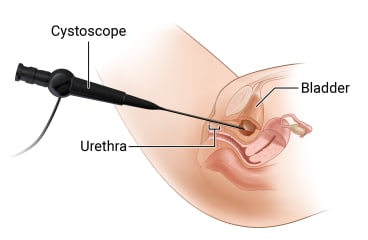What is transurethral resection of the bladder?

Transurethral resection of the bladder is a surgery to remove abnormal tissue (tumor) from the bladder through the urethra. It is also called transurethral resection of bladder tumor, or TURBT.
A tumor in the bladder may be benign (not cancer) or malignant (cancer). This surgery uses a special tool to find and remove a tumor from the bladder. A small sample (biopsy) of the lining of the bladder may also be taken. Any removed tissue will be checked for cancer cells.
The doctor will put a thin, lighted tool into your urethra. This tool is called a cystoscope or scope. The urethra is the tube that carries urine from the bladder to the outside of the body. The doctor will gently guide the scope into your bladder. Your bladder will then be filled with fluid. This stretches the bladder so that your doctor can clearly see the inside of your bladder. Your doctor will use small tools through the scope to take out and/or burn away any abnormal tissue.
How do you prepare for surgery?
This information will help you understand what you can expect. And it will help you safely prepare for surgery.
Preparing for surgery
- Understand exactly what surgery is planned, along with the risks, benefits, and other options.
- Tell your doctor ALL the medicines, vitamins, supplements, and herbal remedies you take. Some may increase the risk of problems during your surgery. Your doctor will tell you if you should stop taking any of them before the surgery and how soon to do it.
- If you take aspirin or some other blood thinner, ask your doctor if you should stop taking it before your surgery. Make sure that you understand exactly what your doctor wants you to do. These medicines increase the risk of bleeding.
- Make sure your doctor and the hospital have a copy of your advance directive. If you don’t have one, you may want to prepare one. It lets others know your health care wishes. It’s a good thing to have before any type of surgery or procedure.
- Be sure you have someone to take you home. Anesthesia and pain medicine will make it unsafe for you to drive or get home on your own.
What happens on the day of surgery?
- Follow the instructions exactly about when to stop eating and drinking. If you don't, your surgery may be canceled. If your doctor told you to take your medicines on the day of surgery, take them with only a sip of water.
- Take a bath or shower before you come in for your surgery. Do not apply lotions, perfumes, deodorants, or nail polish.
- Take off all jewelry and piercings. And take out contact lenses, if you wear them.
At the hospital or surgery center
- Bring a picture ID.
- You will be kept comfortable and safe by your anesthesia provider. You will be asleep during the surgery.
- The surgery will take from 15 minutes to 1 hour.
When should you call your doctor?
- You have questions or concerns.
- You do not understand how to prepare for your surgery.
- You become ill before surgery (such as fever, flu, or a cold).
- You need to reschedule or have changed your mind about having the surgery.
Where can you learn more?
Go to http://www.healthwise.net/patientEd
Enter T220 in the search box to learn more about "Transurethral Resection of the Bladder: Before Your Surgery".
Current as of: October 25, 2024
Author: Ignite Healthwise, LLC Staff
Clinical Review Board
All Ignite Healthwise, LLC education is reviewed by a team that includes physicians, nurses, advanced practitioners, registered dieticians, and other healthcare professionals.

